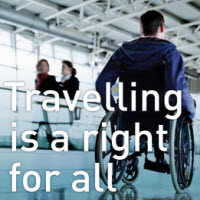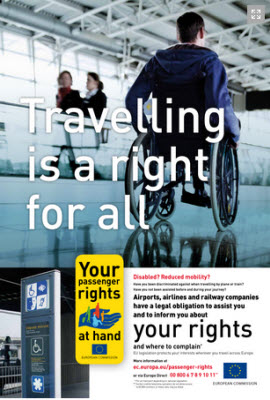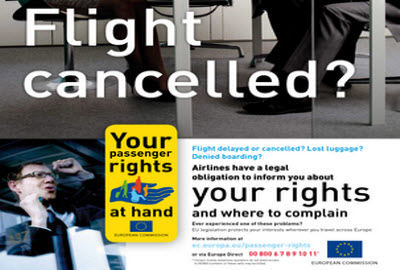European Commission Pushing For Greater Awareness Of Passenger Rights
- Written by Roberto Castiglioni
 The launch of the Passenger Rights campaign signals the European Commission determination in promoting public awareness, Hanna Hinrikus explains in this interview.
The launch of the Passenger Rights campaign signals the European Commission determination in promoting public awareness, Hanna Hinrikus explains in this interview.
At the launch of the Passenger Rights campaign at the end of June EU Commission Vice President and Transport Commissioner Siim Kallas made improving public awareness of passengers’ rights a top priority. "This summer for the first time, holiday-makers can travel across Europe – from London to Lisbon or Ljubljana – knowing they are covered by passenger rights under EU law wherever and however they travel. But passengers need to know their rights to be able to use their rights. This campaign will put more information in their hands."
Hanna Hinrikus, head of the passenger rights portfolio at the Transport Cabinet of  the European Commission, explains the goals and challenges of this campaign in this exclusive interview with Reduced Mobility Rights.
the European Commission, explains the goals and challenges of this campaign in this exclusive interview with Reduced Mobility Rights.
Q. Hanna, great emphasis was placed on the lack of public awareness at the launch of the new passenger rights
information campaign. Isn't it surprising that in spite of all previous efforts to inform consumers two thirds of all passengers are unaware of their rights?
A. The data on awareness levels stem from the last Eurobarometer survey, which was carried out in 2009 and related only to air passenger rights. Since the previous Eurobarometer of 2005, there have indeed not been significant changes in overall awareness level in the EU. However, when looking at the situation in some Member States, a significant rise in awareness could be detected compared to 2005 in Cyprus, Spain, Sweden, Estonia and Ireland. Also those persons who had used air transport recently turned out to be much better informed (43 %) than those who hadn't.
Since 2009, the Commission has launched two awareness raising campaigns. It is to be expected that the results of a future survey would reveal much better awareness levels at least among those citizens who are regular users of transport by air, rail, ship or coach or who have used transport recently.
Q. A survey conducted in 2012 by the Consumer Council for Northern Ireland in conjunction with the European Consumer Centre Ireland and the Irish Commission for Aviation Regulation found that five out of six disabled passengers are totally unaware of their rights when traveling by air. What can be done tackle this lack of awareness?
 A. First and foremost, the transport industry must inform their passengers about their rights. This is an obligation under all EU Passenger Rights legislation irrespective of the mode of transport. Then, national enforcement bodies and also European Consumer Centres are in charge of raising awareness of travelling citizens. The Commission has for instance been informed about a Special Assistance APP developed by the Italian NEB, which has been particularly active in this respect.
A. First and foremost, the transport industry must inform their passengers about their rights. This is an obligation under all EU Passenger Rights legislation irrespective of the mode of transport. Then, national enforcement bodies and also European Consumer Centres are in charge of raising awareness of travelling citizens. The Commission has for instance been informed about a Special Assistance APP developed by the Italian NEB, which has been particularly active in this respect.
In addition, the Commission is carrying out information campaigns including material targeting specifically passengers with disabilities or reduced mobility, such as videos, posters and information provided in leaflets, as well as a passenger rights APP for all modes of transport which also contains relevant information for persons with disabilities or reduced mobility.
Finally, organisations representing persons with disabilities or reduced mobility could also play an important role in raising awareness of this group of passengers.
Q. Associations, charities, and targeted media play a determining role in disseminating information to passengers with special needs. What kind of support does the EU provide these subjects to do more and better?
A. On 15 November 2010 the Commission adopted the European Disability Strategy 2010-2020 as a renewed commitment to a barrier-free Europe. The Strategy for the period 2010-2020 provides a comprehensive framework committing the Commission to empowerment of people with disabilities to enjoy their full rights, and to removing everyday barriers. The Disability Strategy also includes support activities in the EU Member States.
Q. Hanna, the newly launched awareness campaign focuses on the use of eye-catching posters at airports, ports, bus and train stations across Europe, leaflets and information available online. However, airports do little to nothing to inform passengers with disabilities of their rights. In fact, while normally available on websites, no such information can be found inside airport terminals. Is there something you suggest airports could do more, or better, to help passengers easily access offline information about their rights?
A. It must however be noted that airports do not have an obligation under EU legislation to inform passengers about their rights  when travelling by air. This is incumbent on the operating air carriers. The Commission has however contacted European airports through their association ACI in order to ask for support of the Commission's information campaign. Airports have shown great interest in the new visual material prepared by the Commission and have already started ordering posters and leaflets informing passengers, including those with disabilities or reduced mobility about their rights.
when travelling by air. This is incumbent on the operating air carriers. The Commission has however contacted European airports through their association ACI in order to ask for support of the Commission's information campaign. Airports have shown great interest in the new visual material prepared by the Commission and have already started ordering posters and leaflets informing passengers, including those with disabilities or reduced mobility about their rights.
Q. Reduced Mobility Rights recently published research on accessibility of EU airports reveals that the vast majority of European airports are deaf to the needs of people affected by hearing loss. With the exception of hearing loops, no other suitable support is available to deaf passengers. Do you think more should be done to make sure deaf passengers can access information, and enjoy traveling by air in a seamless manner?
A. All actions carried out by airports in order to improve the travel experience of deaf passengers can be considered as a positive sign towards enabling equal access to air transport. If passengers including those with hearing impairments believe that their rights to information under the relevant EU legislation have not been respected they should not hesitate to complain to the competent national authorities.
Q. Finally, do you think the mobile APP launched with the new Passengers Rights campaign will be a determining factor in increasing public awareness of passenger rights?
A. The mobile APP is one of the elements in the new information campaign which is putting more and more emphasis on the use of social media. From our statistics it turns out that the mobile APP is indeed a success story, as passengers increasingly rely on the use of smartphones to obtain information on travel and also on their rights as passengers.










